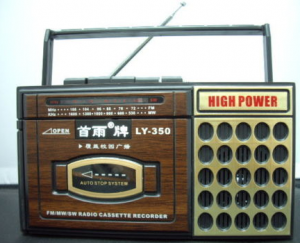I started reading the Professor’s detailed travelogues of his AM and shortwave radio band excursions back when he was writing for WFMU’s Beware of the Blog. After he quit contributing to BotB I learned that he was keeping things going at his own Radio Kitchen blog.
The Professor belongs to a group of radio enthusiasts who record what are known as “airchecks,” which are simply off-air recordings of radio stations. Usually created as a form of historical record, air check recordings serve as an often valuable capture of what is an otherwise mostly ephemeral medium.
In the analog era airchecks were mostly recorded on boombox style radios with built-in cassette recorders. Enthusiasts often traded copies of these tapes with folks from other parts of the country or the world. You see before the internet that was the only way to hear what local radio sounded like somewhere else without traveling.
In the digital era you’d think that recording and sharing radio airchecks would be much easier, given the near ubiquity of digital audio and video recording devices. But while radios with built-in cassette recorders were omnipresent at any electronics or discount store in the 1970s through the 1990s, there are few digital equivalents in existence in the 21st century. Although Apple recently included limited FM radio recording capabilities into its newest iPod Nano, it only records up to 15 minutes, and has no AM reception. So what do you do to digitally record hours of AM or shortwave radio?
The Professor recently took up that very question. One solution one might consider is connecting your computer’s audio input to a radio. The big problem there, however, is that computers generate a ton of RF interference which can seriously mess up AM and shortwave reception. iPods and other MP3 devices wreak similar radio havoc.
In his long, but worthwhile and info-rich, post the Professor gives an overview of the state of recording radio digitally, giving a nice user review of C. Crane’s CC Witness radio, which includes an MP3 recorder.
Aside from recording my own radio programs (usually direct off the studio board), I’ve only dabbled in recording radio airchecks over the years. In the 20th century I also mostly used cassette recorders. Due to sloppy labeling practices I’ve mostly lost all of those tapes over the years. I’ve also done some recordings in the 2000s, primarily to capture source material off shortwave for unfinished audio art projects. I did most of those recordings on minidisc recorders which seem to be very well shielded compared to other digital recorders, injecting almost no noise into the signal.  The last Hi-MD models let me upload the recordings directly onto my computer for sharing and manipulation. Hi-MD is also how I recorded my mediageek radioshow for podcast distribution up until last year.
The last Hi-MD models let me upload the recordings directly onto my computer for sharing and manipulation. Hi-MD is also how I recorded my mediageek radioshow for podcast distribution up until last year.
I’m not sure that I will ever record enough radio airchecks to merit spending $179 on a dedicated digital radio recorder. But I sure am glad that such a device exists, keeping alive a hobby that documents the rich history of broadcasting that otherwise would just dissipate into the ether.



